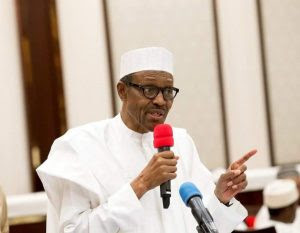President
Muhammadu Buhari wrote himself into history,
yesterday, when he forwarded budgets of agencies and corporations not captured
in the national budget to the National Assembly for consideration.
The president’s action is predicated on the Fiscal Responsibility Act of 2007.
In a June 30 correspondence to Speaker of the House of Representatives, Yakubu Dogara, the president submitted budgets of 38 agencies and corporations in line with extant laws.
The submitted budgets were that of the Central Bank of Nigeria (CBN), Federal Inland Revenue Service (FIRS), Nigerian National Petroleum Corporation (NNPC), Nigerian Ports Authority (NPA), Securities and Exchange Commission (SEC) and National Agency for Food and Drug Administration and Control (NAFDAC).
Others are Bureau of Public Enterprises (BPE), National Maritime Authority (NMA), Federal Airport Authority of Nigeria (FAAN), Nigerian Communications Commission (NCC), Nigerians Deposit Insurance Corporation (NDIC), Nigerians Immigration Service (NIS), Federal Housing Authority (FHA), Federal Mortgage Bank (FMB) and Corporate Affairs Commission (CAC), among others. The president urged lawmakers to expedite action on the budgets and also said that, in line with the provisions of the Act, “budget of the agencies and corporations which have been privatised, or otherwise ceased to exist, are not included, herein.”
In the Sixth National Assembly, lawmakers insisted budgets of revenue-generating federal departments and agencies must be brought to the National Assembly for approval; which led to the enactment of the Fiscal Responsibility Act of 2007. The CBN Act was signed into law on May 25, 2007 by former President Olusegun Obasanjo. It gives power to the CBN board, in Section 6 (3) (a), to consider and approve the bank’s annual budget.
However, on July 30, 2007, then President Umaru Musa Yar’Adua signed the Fiscal Responsibility Act which provides that federal agencies, including the CBN, must submit their budgets to the National Assembly. In compliance with that law, Buhari forwarded the budgets to the federal legislature for scrutiny and approval.
In the Seventh National Assembly, Senator Ita Enang, sponsored a bill to compel the CBN to submit its yearly budget to the National Assembly for approval which scaled Second Reading.
Enang is now Buhari’s special adviser on National Assembly Matters (Senate).
Hitherto, the CBN, relied on its Act, which gave its board the power to approve its budget and refused to submit its annual proposals to the National Assembly.
The president’s action is predicated on the Fiscal Responsibility Act of 2007.
In a June 30 correspondence to Speaker of the House of Representatives, Yakubu Dogara, the president submitted budgets of 38 agencies and corporations in line with extant laws.
The submitted budgets were that of the Central Bank of Nigeria (CBN), Federal Inland Revenue Service (FIRS), Nigerian National Petroleum Corporation (NNPC), Nigerian Ports Authority (NPA), Securities and Exchange Commission (SEC) and National Agency for Food and Drug Administration and Control (NAFDAC).
Others are Bureau of Public Enterprises (BPE), National Maritime Authority (NMA), Federal Airport Authority of Nigeria (FAAN), Nigerian Communications Commission (NCC), Nigerians Deposit Insurance Corporation (NDIC), Nigerians Immigration Service (NIS), Federal Housing Authority (FHA), Federal Mortgage Bank (FMB) and Corporate Affairs Commission (CAC), among others. The president urged lawmakers to expedite action on the budgets and also said that, in line with the provisions of the Act, “budget of the agencies and corporations which have been privatised, or otherwise ceased to exist, are not included, herein.”
In the Sixth National Assembly, lawmakers insisted budgets of revenue-generating federal departments and agencies must be brought to the National Assembly for approval; which led to the enactment of the Fiscal Responsibility Act of 2007. The CBN Act was signed into law on May 25, 2007 by former President Olusegun Obasanjo. It gives power to the CBN board, in Section 6 (3) (a), to consider and approve the bank’s annual budget.
However, on July 30, 2007, then President Umaru Musa Yar’Adua signed the Fiscal Responsibility Act which provides that federal agencies, including the CBN, must submit their budgets to the National Assembly. In compliance with that law, Buhari forwarded the budgets to the federal legislature for scrutiny and approval.
In the Seventh National Assembly, Senator Ita Enang, sponsored a bill to compel the CBN to submit its yearly budget to the National Assembly for approval which scaled Second Reading.
Enang is now Buhari’s special adviser on National Assembly Matters (Senate).
Hitherto, the CBN, relied on its Act, which gave its board the power to approve its budget and refused to submit its annual proposals to the National Assembly.

No comments:
Post a Comment